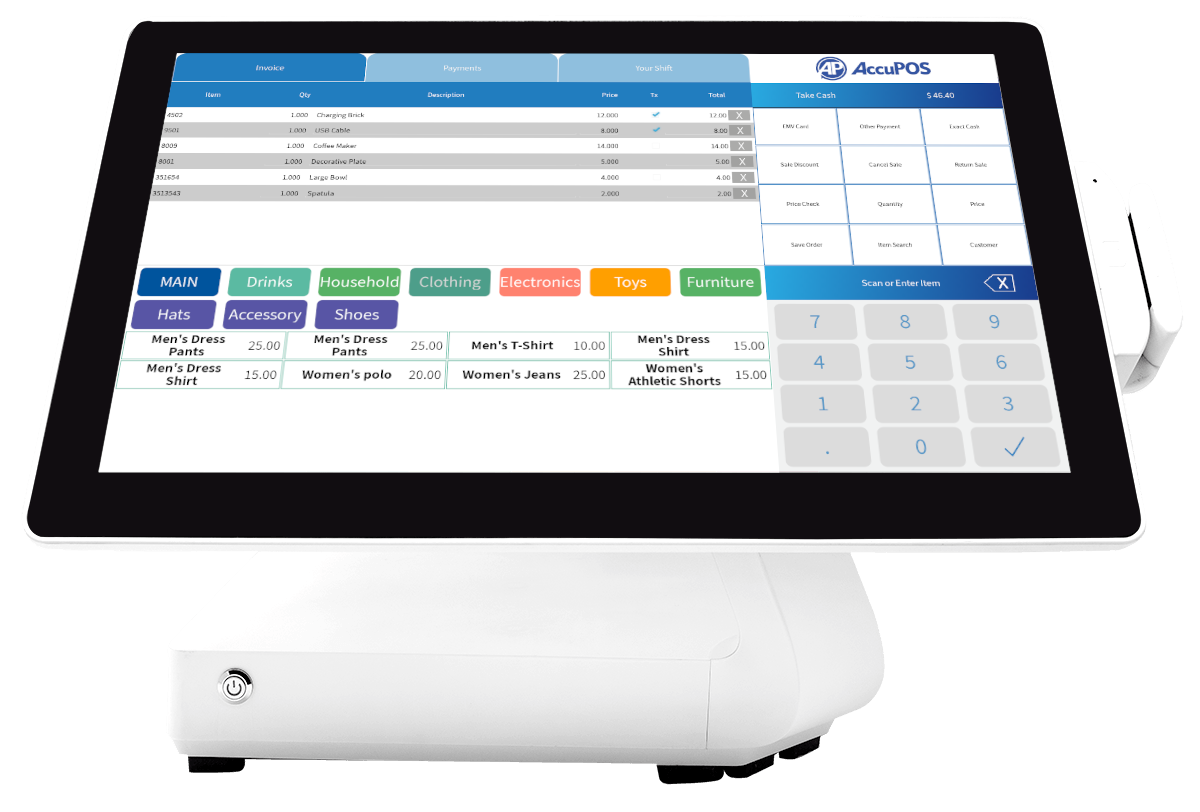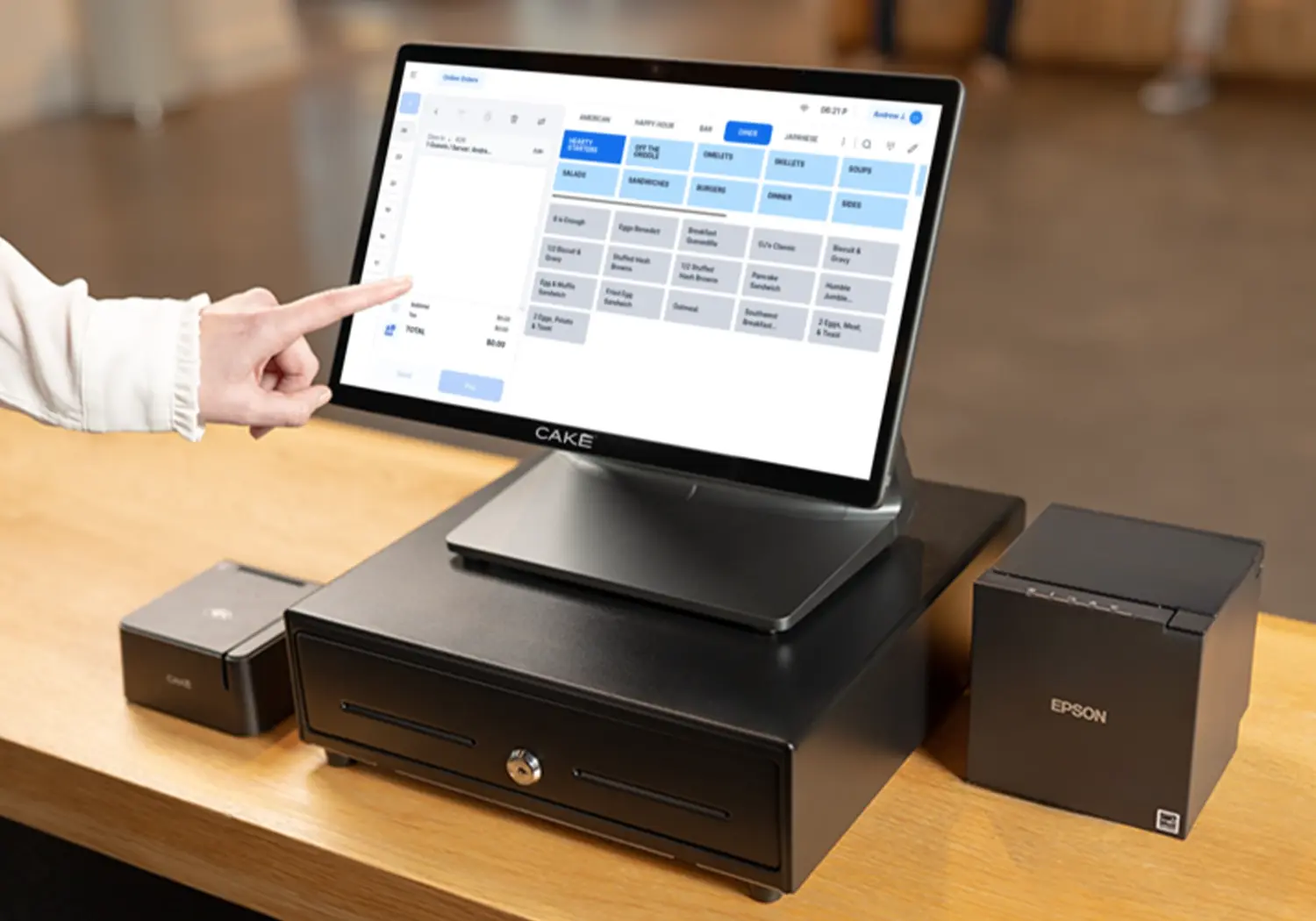More About Clover Pos
More About Clover Pos
Blog Article
More About Point Of Sale

Point of Sale Software: Retail Point-Of-Sale Solutions Streamline Deals
The Ultimate Guide To Pos System For Small Business

Hardware Elements of a Point of Sale System What makes a POS system tick? It's not simply software; the hardware plays a starring function. Think of it as the body to the software's brain. Without the best hardware, even the most advanced POS software is just a pretty face. Essential POS Hardware So, what are the must-haves? Let's simplify. The central processing unit, often a computer system or tablet, is the heart of the operation. The display or touchscreen display permits staff to engage with the system. A barcode scanner speeds up the checkout process. Remember the days of manually entering each code? The reliable invoice printer offers clients with a record of their purchase. A money drawer keeps your cash safe and organized. A card reader enables customers to pay with credit or debit cards. Diving Deeper: Beyond the Fundamentals But wait, there's more! Depending on your business, you may require specialized hardware. For example, a restaurant might incorporate kitchen printers to relay orders, while a retailer may utilize label printers for item tagging. Ever wonder how your local pastry shop immediately prints those delicious-looking labels? Selecting the Right Hardware: A Balancing Act Selecting the ideal hardware isn't more info almost buying the most pricey equipment. It's about discovering the sweet spot between performance, sturdiness, and budget. A small business just beginning out might choose a more standard setup, while a high-volume seller will need robust, high-performance machines. Is it better to purchase brand-new or used? Consider your options carefully. A new system offers the most recent innovation and service warranty security, however a reconditioned system can save you money. The Future of POS Hardware What does the future hold? Anticipate to see even more integration with mobile phones, biometric scanners for worker authentication, and advanced analytics control panels displayed on bigger, clearer screens. Picture a world where stock is immediately updated in real-time as products are scanned-- a world where you can track your best-selling item from throughout the world. The possibilities are limitless, and the hardware is continuously evolving to fulfill the demands of today's businesses. Are you all set to update your point of sale system?
Software Characteristics and Capabilities: The Heart of Your POS System
Ever watch a seasoned barista slide through a busy early morning rush? Their trick isn't simply caffeine; it's a seamless dance with their POS system. The software is the conductor of your business symphony, managing whatever from sales to stock. What notes should you be listening for? What abilities really matter in today's market?
Stock Management: Beyond Counting Beans
Forget spreadsheets that haunt your dreams. Modern POS systems provide real-time stock tracking, informing you when your stock of artisanal coffee beans dips precariously low. Consider it as a digital guardian angel, avoiding those awkward "Sorry, we're out!" moments to consumers. What if you could also anticipate demand based upon historic data? Many systems now provide forecasting tools, an effective weapon against overstocking and lost sales. This helps avoid the circumstance of running out of popular products or building up excess inventory of slow-moving items, both of which can constrain capital and space.
Sales Reporting and Analytics: Decoding the Information
Sales information is the brand-new gold, and your POS system is the miner. Forget simply knowing how much you sold today. Dive deep into the information to discover patterns, recognize your very popular items, and comprehend customer behavior. Which menu product pairs completely with the day-to-day special? Which promotion resonated most with your clients? These insights are not simply interesting; they're actionable intelligence. Without reliable sales reporting, browsing the complexities of service decision-making becomes like cruising without a compass, increasing the chance of bad moves and missed out on chances.
Client Relationship Management (CRM): Building Bridges, Not Walls
Keeping in mind a routine client's name and preferred order is captivating, however scaling that individual touch is challenging. POS systems with CRM capabilities enable you to track customer purchase history, choices, and even birthdays. Envision automatically providing a discount rate on their birthday-- a small gesture that fosters commitment and motivates repeat company. However there is the potential snag of bad data quality, which can cause incorrect customer profiles and inefficient marketing efforts.
Payment Processing: Improving the Deal
The checkout experience can make or break a sale. Seamless integration with various payment techniques-- credit cards, mobile wallets, even copyright-- is non-negotiable. Can your system deal with split payments? Does it use secure tokenization to safeguard customer data? A cumbersome payment process resembles hitting a sour note in your business symphony, potentially interfering with the whole efficiency. Ensuring compatibility with evolving payment technologies and adherence to security requirements are paramount for keeping customer trust and functional effectiveness.
Staff Member Management: Keeping the Group in Sync
From clocking in and out to managing authorizations and tracking performance, staff member management includes improve operations and enhance responsibility. Is scheduling a problem? Numerous POS systems use incorporated scheduling tools, enhancing staffing levels based upon predicted need. A typical barrier that is frequently neglected is the challenge of integrating worker management performances with payroll systems, which can result in errors and inadequacies in wage calculations.
Advanced Features: Leveling Up Your Operations
- Table Management: Perfect for restaurants, this feature permits you to picture your dining room, track table status, and manage reservations.
- Loyalty Programs: Reward your best customers and encourage repeat service with incorporated commitment programs.
- Online Buying Combination: Perfectly integrate your POS system with online ordering platforms to expand your reach.
Selecting the right POS system is about more than just functionality; it's about finding a partner that can grow with your organization. Consider your existing needs, expect future development, and do not hesitate to ask the tough questions. The right software application can transform your organization from a chaotic cacophony into an unified masterpiece.
Industry-Specific POS System Applications
Think about the local bakery, dynamic with early morning clients craving fresh croissants. A generic POS system might manage transactions, but can it manage intricate dishes, track active ingredient inventory, or immediately adjust production schedules based on sales data? Most likely not. That is where the appeal of industry-specific POS systems shines.
Restaurants and Hospitality
For bustling restaurants, speed and precision are critical. How numerous times have you seen servers handling orders, modifications, and splitting bills, all while trying to supply excellent service? A dining establishment POS system streamlines these procedures, allowing for table management, cooking area order tickets, and even online purchasing combination. These systems typically include functions like ingredient-level inventory tracking, crucial for handling food costs and lessening waste. Ever wonder why your preferred meal is sometimes unavailable? It might originate from an absence of appropriate stock management.
- Table Management
- Kitchen Area Order Tickets
- Online Purchasing Combination
- Ingredient-Level Inventory Tracking
Retail Solutions
Retail, with its varied inventory and client interactions, demands a different set of tools. Imagine a boutique clothing store having a hard time to monitor sizes, colors, and seasonal collections using a fundamental checkout system. An industry-specific retail POS system offers features like barcode scanning, customer loyalty programs, and in-depth sales reporting. These systems can even incorporate with e-commerce platforms, providing a smooth omnichannel experience for customers. Did you know some retail POS systems can anticipate future sales trends based upon historic data? Now that is powerful!
The Dangers of an Inequality
Picking the wrong POS system can produce substantial functional obstacles. A clothing shop using a dining establishment POS, for instance, would find it inappropriate for managing inventory with sizes and colors. The lack of correct reporting and analytics could result in misinformed getting decisions and lost profits. The result might be similar to trying to fit a square peg in a round hole.
Secret Considerations
Selecting an industry-specific POS system requires mindful examination. Think about your service's special needs and operational workflows. Does the system incorporate with existing software? Does it offer the required reporting capabilities? Is it scalable to accommodate future development? A well-chosen POS system is not simply a deal tool; it's a strategic property that can drive effectiveness, enhance customer satisfaction, and ultimately, boost your bottom line. Keep in mind, it is an investment in your service's future, not simply an expense.
Security Factors To Consider for Point of Sale Systems
Ever heard the tale of the mom-and-pop shop that lost whatever due to the fact that of a single, overlooked security defect in their POS system!.?. !? It's a cautionary tale, and it highlights a crucial aspect often eclipsed by the appeal of elegant features and structured operations. The reality is, a POS system is just as excellent as its security. What good is a system that crunches numbers in a flash if it permits crooks to swipe customer's information just as quickly?
The Vulnerability Minefield
The digital landscape is a battlefield. Every POS system, no matter size or elegance, is a potential target. Are you truly prepared for the threats prowling around the corner? The genuine pinch comes when you find that your outdated software has an open hole that hackers can make use of, turning your organization into an unwitting accomplice in identity theft. The difficulty is that hackers are crafty and are constantly altering their methods.
Common Security Gaps and Specialist Tips
- Weak Passwords: "Password123" isn't sufficing. Usage strong, distinct passwords for all POS system accounts and alter them regularly. Two-factor authentication is a must.
- Unsecured Networks: Your Wi-Fi is like leaving the front door open. Protect your network with strong encryption (WPA3 if possible) and consider a separate network for your POS system.
- Out-of-date Software: Software application suppliers patch security holes all the time. Stopping working to upgrade resembles welcoming trouble. Establish automated updates or schedule routine upkeep.
- Staff member Training: Your staff is your very first line of defense. Train them to recognize phishing efforts, secure passwords, and report suspicious activity.
Data File Encryption: Your Guard Versus the Dark Arts
Think of information file encryption as a secret code. It scrambles sensitive information, like charge card numbers, making it unreadable to unapproved users. Without encryption, your clients' financial information are like sitting ducks, ripe for the selecting by cybercriminals. It's not almost securing your clients; it's about safeguarding your track record and preventing substantial fines.
PCI Compliance: The Rulebook You Can't Neglect
If you accept credit cards, you're bound by the Payment Card Industry Data Security Standard (PCI DSS) It's a set of security requirements developed to safeguard cardholder information. Stopping working to comply can result in fines, penalties, and even the loss of your capability to process charge card payments. It's a headache, yes, however it's a required one. Think of PCI compliance as the expense of doing organization in the digital age.
Consider this: every deal processed through your point of sale is a potential entry point for destructive actors. By implementing robust security steps, you're not simply safeguarding your business; you're protecting your clients' trust and making sure the long-term viability of your operations. The security of your POS system isn't simply a technical problem; it's a service vital. It needs constant watchfulness, proactive measures, and a commitment to staying ahead of the curve.